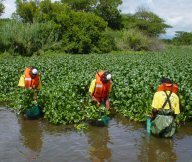Working for Water (WfW) programme
Introduction and background
Invasive alien species are plants, animals and microbes that are introduced into countries, and then out-compete the indigenous species.Invasive alien species are causing billions of rands of damage to South Africa’s economy every year, and are the single biggest threat to the country’s biological biodiversity.
Invasive alien plants (IAPs) pose a direct threat not only to South Africa’s biological diversity, but also to water security, the ecological functioning of natural systems and the productive use of land. They intensify the impact of fires and floods and increase soil erosion. IAPs can divert enormous amounts of water from more productive uses and invasive aquatic plants, such as the water hyacinth, effect agriculture, fisheries, transport, recreation and water supply.
Of the estimated 9000 plants introduced to this country, 198 are currently classified as being invasive. It is estimated that these plants cover about 10% of the country and the problem is growing at an exponential rate.
The fight against invasive alien plants is spearheaded by the Working for Water (WfW) programme, launched in 1995 and administered previously through the Department of Water Affairs and Forestry and now the Department of Environmental Affairs. This programme works in partnership with local communities, to whom it provides jobs, and also with Government departments including the Departments of Environmental Affairs and Tourism, Agriculture, and Trade and Industry, provincial departments of agriculture, conservation and environment, research foundations and private companies.
Since its inception in 1995, the programme has cleared more than one million hectares of invasive alien plants providing jobs and training to approximately 20 000 people from among the most marginalized sectors of society per annum. Of these, 52% are women.
WfW currently runs over 300 projects in all nine of South Africa’s provinces. Scientists and field workers use a range of methods to control invasive alien plants. These include:
- Mechanical methods - felling, removing or burning invading alien plants.
- Chemical methods - using environmentally safe herbicides.
- Biological control - using species-specific insects and diseases from the alien plant’s country of origin. To date 76 bio-control agents have been released in South Africa against 40 weed species.
- Integrated control - combinations of the above three approaches. Often an integrated approach is required in order to prevent enormous impacts.
The programme is globally recognised as one of the most outstanding environmental conservation initiatives on the continent. It enjoys sustained political support for its job creation efforts and the fight against poverty.
WfW considers the development of people as an essential element of environmental conservation. Short-term contracts jobs created through the clearing activities are undertaken, with the emphasis on endeavouring to recruit women (the target is 60%), youth (20%) and disabled (5%). Creating an enabling environment for skills training, it is investing in the development of communities wherever it works. Implementing HIV and Aids projects and other socio- development initiatives are important objectives.
Aims and objectives
Objective:
- To reduce the density of established, terrestrial, invasive alien plants, through labour intensive, mechanical and chemical control, by 22% per annum.
Working for water aims to improve the integrity of natural resources by:
- Preventing new and emerging invasive alien plant problems through:-
- Strategies to prevent new and emerging weeds
- An early detection rapid response system
- A monitoring and evaluation framework to assess the progress of the emerging invasive alien plant management effort
- Partnering with and tapping into the expertise and resources of the South African National Biodiversity Institute (SANBI)
- The establishment of national and regional invasive alien plant co-ordinating committees
- The implementation of an appropriate data management system for new emerging species.
- Reducing the impact of existing priority invasive alien plants through:-
- The quantification of the extent of invasive alien plant survey.
- The development of prioritisation frameworks
- The development of best management practice informed by applied research
- The development of management unit clearing programmes, annual plans of operations and business plans
- Monthly key performance indicator reports, quarterly Expanded Public Works Programme (EPWP) reports and self-assessment
- The development and implementation of a monitoring and evaluation framework to assess progress of the invasive alien plant management effort
- The establishment of a national and regional oversight committee
- The implementation of an appropriate data management system for new and emerging species
- Enhancing capacity and commitment to solve invasive alien plant problems through:-
- The development of a combined environmental implementation and management plan
- The establishment of a skills development programme
- Co-ordinating policy, legislative and planning frameworks (national and international)
- Implementing an advocacy and awareness strategy



